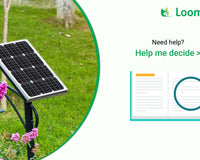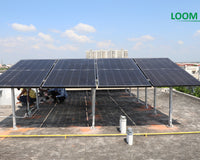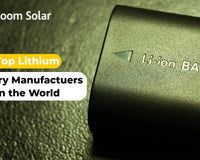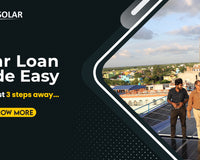Installing a solar inverter with a battery for your home can deliver several advantages, like reducing your reliance on the electrical grid, reducing your electricity bills, and providing backup power during outages.
Solar Inverter
It is also known as a photovoltaic (PV) inverter and is an essential component of a Solar System. Its primary function is to convert the direct current (induced by solar panels) into an alternate current (used in our home). Solar inverters come in different types, including.
- A string of solar inverters - It is also known as central inverters. They have been around for decades and are affordable. String solar inverters worked at small-scale solar installations and only one inverter for all panels.
- Micro inverters- An inverter is installed on each solar panel to convert the DC into AC electricity. They are small as Set-top boxes.
- Power optimizers - a hybrid of both a string inverter and a micro inverter. With the latest technology, the panel optimizers relay overall performance characteristics through a tracking system to facilitate operations and any essential solar panel protection.
Note
The choice depends on your specific needs, the size of your solar panel system, and more unique factors.
Battery
An optional element that can be added to a solar system. It allows the storage of extra electricity generated by solar panels during the sunshine. It is usable when the panels are not producing enough power, such as at night or during shed periods. Batteries can also provide backup power in case of grid outages. Common types of batteries used in home solar systems include.
- Lead-acid battery- Lead-acid batteries work on a chemical reaction between lead and sulfuric acid to store and release electrical energy and be workable for many years (shorter lifespan). Commonly found in various applications, including automotive, uninterruptible power supplies (UPS), and off-grid power systems.
- Lithium-ion battery- The primary component is electrochemical reactions. Lithium batteries have become broadly popular in recent years due to their high energy density, lightweight design, and Long-lifespan. Lithium batteries exist in large-scale applications, including portable electronics (like mobile), electric vehicles, renewable energy storage, etc.
Benefits of Solar Inverter and Battery Systems
- Energy Independence: With a solar inverter and battery system, you can generate and store your electricity, reducing your reliance on the electricity grid and potentially reducing your energy bills.
- Backup Power: During power outages, a battery system can provide a backup power supply, keeping essential appliances running and ensuring comfort and safety.
- Environmental Benefits: Utilizing solar energy can reduce your carbon emission and contribute to a greener and cleaner environment.
Suggestions
It's important to note that the suitability and sizing of a solar inverter and battery system depend on factors such as your power consumption, available area, local limitations, and budget.
Consulting with our professional solar installer or a Solar energy expert can help determine the most appropriate solution for an individual's needs and provide accurate cost estimates.












